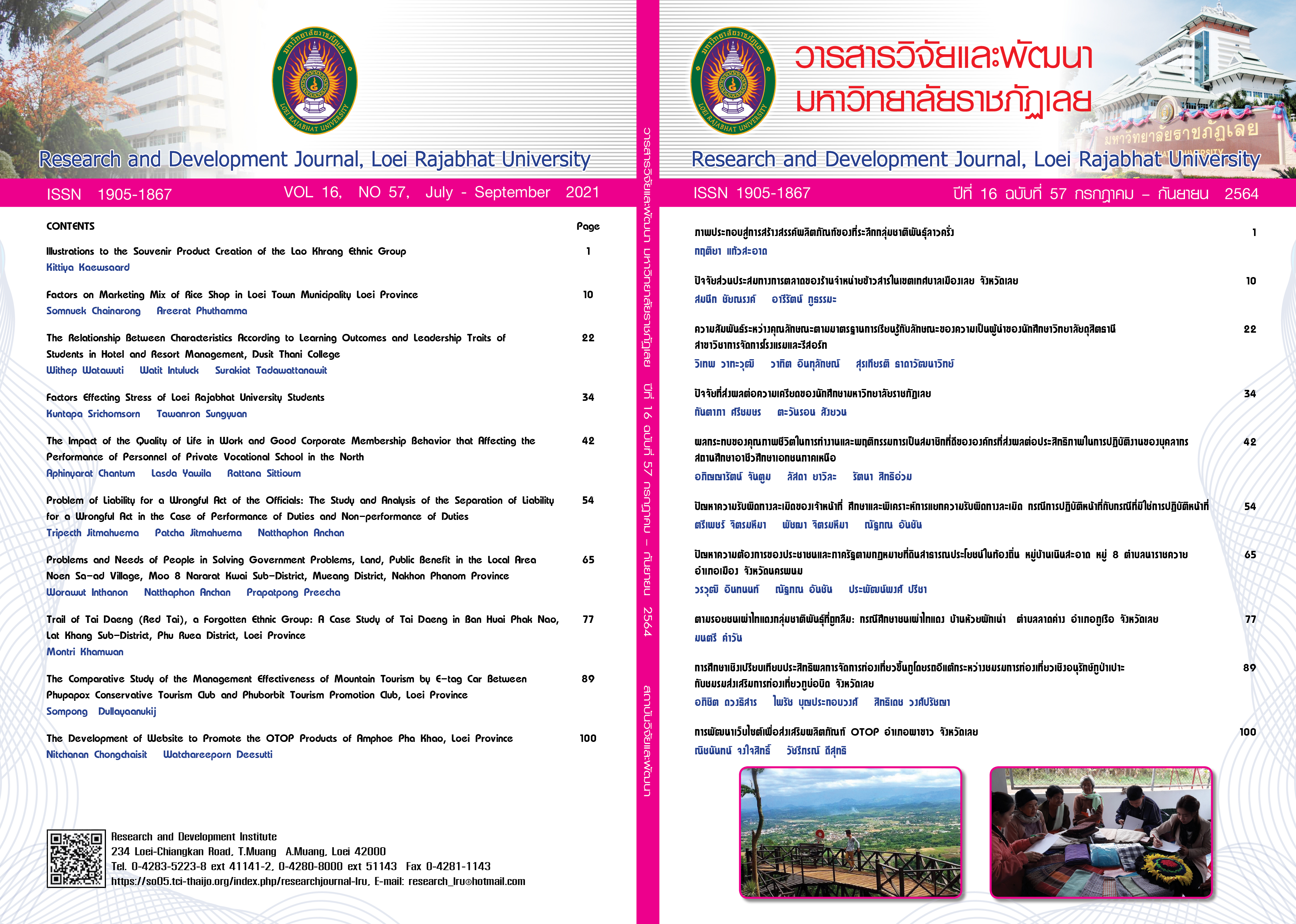ความสัมพันธ์ระหว่างคุณลักษณะตามมาตรฐานการเรียนรู้กับลักษณะของความเป็นผู้นำ ของนักศึกษาวิทยาลัยดุสิตธานี สาขาวิชาการจัดการโรงแรมและรีสอร์ท
คำสำคัญ:
มาตรฐานการเรียนรู้, ลักษณะความเป็นผู้นำ, กรอบมาตรฐานคุณวุฒิระดับอุดมศึกษาแห่งชาติบทคัดย่อ
วัตถุประสงค์ของงานวิจัยนี้ คือ 1) เพื่อศึกษาคุณลักษณะตามมาตรฐานการเรียนรู้ของนักศึกษา 2) เพื่อศึกษาลักษณะความเป็นผู้นำของนักศึกษา 3) เพื่อเปรียบเทียบปัจจัยด้านประชากรศาสตร์ที่มีต่อคุณลักษณะตามมาตรฐานการเรียนรู้และลักษณะความเป็นผู้นำของนักศึกษาและ 4) เพื่อศึกษาความสัมพันธ์ของคุณลักษณะตามมาตรฐานการเรียนรู้ และลักษณะความเป็นผู้นำของนักศึกษาวิทยาลัย ในการศึกษาครั้งนี้ใช้กลุ่มตัวอย่างทั้งหมด 196 ตัวอย่างจากนักศึกษาวิทยาลัยดุสิตธานี สาขาการจัดการโรงแรม และรีสอร์ท เครื่องมือในการวิจัยคือแบบสอบถามแบบ rating scale ที่มีค่าความเชื่อมั่น 0.94 ข้อมูลได้ถูกวิเคราะห์ด้วย สถิติเชิงพรรณนา ได้แก่ ความถี่, ร้อยละ, ค่าเฉลี่ย, ส่วนเบี่ยงเบนมาตรฐาน และ สถิติเชิงอนุมาน ได้แก่ t-test, One-way ANOVA และ การวิเคราะห์สัมประสิทธิ์สหสัมพันธ์แบบ Pearson
ผลการศึกษาพบว่า ผู้ตอบแบบสอบถามส่วนใหญ่เป็นเพศหญิงอายุเฉลี่ย 18-20 ปี มีเกรดเฉลี่ยสะสมอยู่ระหว่าง 1.76 ถึง 2.51 ซึ่งส่วนใหญ่อาศัยอยู่ในเขตกรุงเทพฯและปริมณฑล และทั้งบิดาและมารดามีอาชีพประกอบธุรกิจส่วนตัว นอกจากนี้ยังพบว่า 1) ระดับของคุณลักษณะตามมาตรฐานการเรียนรู้อยู่ในระดับปานกลาง 2) ลักษณะความเป็นผู้นำของนักศึกษาวิทยาลัยดุสิตธานี สาขาการจัดการโรงแรม และรีสอร์ทอยู่ในระดับปานกลาง 3) การเปรียบเทียบคุณลักษณะตามมาตรฐานการเรียนรู้แยกตามเพศ ไม่มีความแตกต่างกัน หากแยกตามปีการศึกษา พบความแตกต่างที่ระดับนัยสำคัญ .05 ในขณะที่การเปรียบเทียบลักษณะความเป็นผู้นำของนักศึกษาวิทยาลัยดุสิตธานีแยกตามเพศ และปีการศึกษาไม่มีความแตกต่างที่ระดับนัยสำคัญ .05 และ 4) การทดสอบทางสถิติพบความสัมพันธ์ของคุณลักษณะตามมาตรฐานการเรียนรู้ และลักษณะความเป็นผู้นำของนักศึกษาวิทยาลัยดุสิตธานีอยู่ในระดับสูงที่ระดับนัยสำคัญ .01 (r = .71)
เอกสารอ้างอิง
ฉวีวรรณ แจ้งกิจ และคณะ. (2554). รายงานการวิจัยเรื่อง คุณลักษณะของบัณฑิตที่พึงประสงค์ตามกรอบมาตรฐานคุณวุฒิระดับอุดมศึกษาแห่งชาติของสาขาวิชาอุตสาหกรรมการบริการอาหาร (รายงานการวิจัย). กรุงเทพฯ: มหาวิทยาลัยเทคโนโลยีราชมงคลพระนคร.
ทัศนีย์ และคณะ. (2549). ศึกษาคุณลักษณะมาตรฐานผลการเรียนรู้ตามกรอบมาตรฐานคุณวุฒิระดับอุดมศึกษาแห่งชาติ (TQF) ของนักศึกษาชั้นปีที่ 4 มหาวิทยาลัยหาดใหญ่. บทความวิจัย เสนอในการประชุมหาดใหญ่วิชาการ ครั้งที่ 4วันที่ 10 พฤษภาคม 2556, pp. 459 – 468. การประชุมวิชาการหาดใหญ่วิชาการ มหาวิทยาลัยหาดใหญ่, สงขลา.
ภารดี อนันต์นาวี. (2549). การวิเคราะห์ภาวะผู้นำของนิสิตสตรีระดับปริญญาโทสาขาวิชาการบริหารการศึกษา คณะศึกษาศาสตร์ มหาวิทยาลัยบูรพา. วารสารศึกษาศาสตร์ มหาวิทยาลัยบูรพา, 17(2), 63-76.
รภัสศา พิมพา. (2557). ภาวะผู้นำของนิสิตครูหลักสูตรการศึกษาบัณฑิต (กศ.บ. 5 ปี) มหาวิทยาลัยศรีนครินทรวิโรฒ (ปริญญานิพนธ์การศึกษามหาบัณฑิต). มหาวิทยาลัยศรีนครินทรวิโรฒ ประสานมิตร, กรุงเทพฯ.
วิทยาลัยดุสิตธานี. (2557). วิทยาลัยดุสิตธานี. สืบค้น จาก https://dtc.ac.th/
อัจฉราวรรณ ณ สงขลา และคณะ. (2554). รายงานการวิจัยเรื่อง คุณลักษณะของบัณฑิตที่พึงประสงค์ตามกรอบมาตรฐานคุณวุฒิ ระดับอุดมศึกษาแห่งชาติ ของสาขาวิชาเทคโนโลยีการจัดการสินค้าแฟชั่น คณะเทคโนโลยีคหกรรมศาสตร์ มหาวิทยาลัยเทคโนโลยีราชมงคลพระนคร (รายงานการวิจัย). กรุงเทพฯ: มหาวิทยาลัยเทคโนโลยีราชมงคลพระนคร.
Adrianna, K. & Deb, M. (2000). Expanding our understanding of student leadership development: A study exploring gender and ethnic identity. Journal of College Student Development, 41(1), 55-69.
Krejcie, R. V., & Morgan, D. W. (1970). Determining sample size for research activities. Educational and psychological measurement, 30(3), 607-610.
Logue, C. T., Hutchens, T. A., & Hector, M. A. (2005). Student leadership: A phenomenological exploration of postsecondary experiences. Journal of College Student Development, 46(4), 393-408.
Posner, B. & Brodsky, B. (1993). The leadership practices of effective RAs. Journal of College Student Development, 34(4), 300-304.
Smart, J. C., Ethington, C. A., Riggs, R. O. & Thompson, M. D. (2002). Influences of Institutional Expenditure Patterns on the Development of Students’ Leadership Competencies. Research in Higher Education, 43(1), 115-132.
ดาวน์โหลด
เผยแพร่แล้ว
รูปแบบการอ้างอิง
ฉบับ
ประเภทบทความ
สัญญาอนุญาต
ข้อความที่ปรากฎในวารสารฉบับนี้เป็นความคิดเห็นของผู้เขียนแต่ละท่าน สถาบันวิจัยและพัฒนา มหาวิทยาลัยราชภัฏเลย และกองบรรณาธิการ ไม่จำเป็นต้องเห็นด้วยและไม่มีส่วนรับผิดชอบใดๆ
สถาบันวิจัยและพัฒนา มหาวิทยาลัยราชภัฏเลย ขอให้ผู้อ่านอ้างอิงในกรณีที่ท่านคัดลอกเนื้อหาบทความในวารสารฉบับนี้






